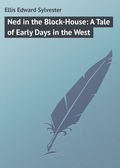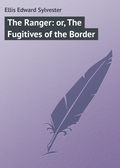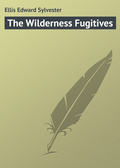
Ellis Edward Sylvester
The Frontier Angel: A Romance of Kentucky Rangers' Life
"P'r'aps so – bein' it's your wish we'll do our best to do it, and," added Peterson to himself, "O Lordy! won't we skemer the old devil when we git him. We'll toast him afore a slow fire, I'll bet my life."
"Get him, if you can, Jim, and you will confer a favor that I shall never be able to repay."
"Never mind about that, the thing will be done!"
Shortly after this, Peterson took his departure.
CHAPTER V.
THE MYSTERIOUS WARNING
It was a mild September night in 179-. The day had been one of those warm, hazy ones that sometimes appear at that season of the year, and the night had set in with delicious coolness. There was a faint moon in the heavens, and several flaky clouds were drifting past it, causing their fantastic shadows to glide like phantoms over the settlement, sometimes, for a moment, throwing it into shadow, and then permitting the moonlight again to stream down upon it.
Most of the settlers had withdrawn within their cabins, and as the hour had grown quite late, there were few, if any, stirring through the village. A few pencils of light issued from the upper port-holes of the block-house, showing that those inside were still up; and a hearty laugh, ringing out now and then, told as plainly that they were engaged in their usual habit of story-telling and joking. Peterson was inside relating one of his earlier experiences, which infinitely amused them all, the commander not hesitating to join in the merriment.
On the outside, the slow-measured tread of the sentinel was heard, and his form could be seen against the wall of the block-house, as he walked to and fro upon the platform. His keen eye never failed to take in at every turn, every noticeable object before him. At one end of the projection, he had a view of the river, now glistening in the sheen of the moonlight like liquid silver; and, during the remainder of his walk, his vision rested upon the broad, gloomy, murmuring forest, stretching mile after mile before him, until, at last, it joined the sky away in the faint horizon. It was Dick Dingle, whose watch extended until midnight.
While in the act of turning on his heel, at the end of the platform, he suddenly stopped as something suspicious caught his eye. Far up the Ohio, at such a distance that it would have been invisible to ordinary eyes, he saw a small, dark body in the water. At first, it had the appearance of a large bird swimming over the surface, but the hunter well knew that it was a canoe, approaching from the Ohio side. A slight protuberance near the middle, convinced him that there was but one person in it.
When about three-fourths of the way across, the sparkle of the ashen oars could be seen, as they dipped in the water. A moment after, it entered the line of shadows upon the Kentucky shore and disappeared.
Dingle's suspicion was aroused. The long silence and inactivity of the savages had led him to the belief that they were preparing to strike a great blow upon the settlements. Neither he nor Peterson had been scouting lately, and he had no means of discovering their intentions.
"Leastways, Dick Dingle," he muttered, as he resumed his walk, "it won't do fur you to wink both eyes at the same time. Look out fur sign."
He continued walking with the same measured, deliberate tread backward and forward, apparently watching nothing, and yet maintaining a more than usual scrutiny upon the river and forest. A half-hour passed away, and finally an hour had elapsed, without bringing any new suspicion to him; but he was well aware that this delay was as good reason for apprehension, as could have been the noise of approach.
"You don't cotch Dingle asleep in the night-time, or when there's reds about. It would do to let on that. Now let's see, Dingle, you old fool, what do you s'pose the imps are up to now? Jest go to meditatin' will you and cipher it out. In the first place, and afore anything else, they're up to sunkthin'; and that ar' sunkthin' is the devil. Consequently, it's a pinted fact, that they're up to the devil, and therefore, Dingle, there's sunkthin' in the wind; so mind your eye and look out for squalls. Wish they'd hurry up 'cause it's gettin' well on to that green feller's watch, and I'd like to have an idee given me of their intentions ef they're no partickler objections."
The eccentric ranger continued his walk, occasionally interspersing it with characteristic observations similar to those above; and, all the time, wondering why it was that something else "didn't turn up" to give him an "idee"; but another hour wore away without bringing the desired knowledge to him.
By this time, it was near midnight, and shortly after, a man appeared beside him to relieve him of his watch. This new-comer was known as Jenkins, and was what the rangers termed a "green hand: " that is, he had seen little or nothing of Indian service, and was not one who could be relied upon in an emergency. Several practical jokes had been played upon him, such as getting him into the wood and raising an alarm of Indians, or firing very closely to him from concealment; and the result of these same tricks had given one or two a suspicion that he was somewhat lacking in courage, and would show the white feather if pressed to the wall.
"Careful and not get a snoozin' to-night," remarked Dingle.
"Why? you don't s'pose I would, do you?"
"Didn't know but what you might; thought I'd tell you anyway, 'cause it won't do to shut your eyes to-night."
"Why? what's the matter? What's up, eh?" queried Jenkins eagerly.
"Oh, nothin' in partickler; only I've seen Injins to-night."
"Pshaw! don't say so? You're joking, Dick?"
"Ef you think so, jest think on, but ef you don't see sights afore mornin', it'll be 'cause you can't see: that's all," and Dingle with a warning shake of his head turned to enter the block-house.
"Oh say, Dick, that ain't fair!" said Jenkins, laying his hand on his shoulder.
"What's the matter? Ain't scart, be you?" demanded the ranger, confronting him with an angry countenance.
"Oh! no-no-no, I ain't scart at all – not at all; I only want you to tell a feller all about it. You might do that, I think."
"Wal, see hyer then. I seed four or five Shawnees skulking out yonder near the wood, tryin' to draw bead on me, and I had to do some tall dodging to hender them. You'll have to hop around rather agile, but I guess you can steer clear. Ef you git hit, holler and I'll haul you in and let you die inside."
"Oh, thunder! hold on. Dingle, don't go and leave a feller this way. I don't think it's the fair shake at all."
"What in blazes do you want?" demanded the ranger, again indignantly facing him.
"Why, I was a-going to say – just to kind of make the observation, you know – that – perhaps – I would think – that is – I would like to know if you wouldn't just as lief stay out here a while?"
"What for?"
"Oh, just for company. I'll do the same favor for you some of these times."
"I never want anybody out hyer when I'm standin' watch."
"Won't you stay. Dingle?"
"No."
And the scout turned and entered the block-house. But it was by no means his intention to intrust the safety of the settlement to such hands as Jenkins'; he only wished to test his courage, and create a little diversion for his own individual benefit. He shut the door and listened.
He could hear Jenkins walking along the platform, stamping his feet bravely upon it, and whistling as loudly as his lips would possibly permit him. Dingle ventured to open the door very slightly and peep out at him. He saw him with his hands thrust deep down into his pockets, his rifle leaning against the block-house, and shooting his feet far out in advance, and slapping them down on the planks with such effect as to set the men within growling and snarling at each other, as they half awoke from their slumbers. His hat was jammed down upon the back of his head, his hair dashed away from his forehead, the white of his eyes only being visible, as the pupils were constantly turned toward the dreaded wood. His mouth resembled the letter O, fringed around the edges, as he resolutely maintained its position. "Old Hundred" came out loudly, the fall of each foot being emphasized by a desperate burst of wind and music, and a spasmodic jerk of the head now and then. When the whistle, at times, became more windy than musical, he rested his lips by communings with himself.
"Darn the Injins! I wish they were all dead! I can't see what they want poking round here when I'm standing watch. If I catch sight of one, I'll bet he will wish he never heard of Pete Jenkins! They're mean to be watching us all the time. If I was the Injins, I would keep hunting the deers and bears and I never would come around here when I was standing watch, but I'd shoot that Dingle, because he's so everlastingly mean. Let me see: I was turning 'Old Hundred,' I believe." The tune was now resumed, and continued a short time, when he again broke forth. "If them Injins will only stay away till morning I won't care, though it would be all the same to me, and perhaps just as well if they didn't come then either. I was just thinking – hello! Jerusalem! I seen something move then as sure as the world!"
Dingle, who had been listening all the while, now judged that it was time to venture forth, and, closing the door behind him, stood upon the platform. Jenkins, whose eyes were turned toward the wood, saw nothing of him, until he tumbled over his bent form.
"Thunderation! that you. Dingle? what you doing here?" he exclaimed, scrambling to his feet again.
"I thought I'd come out and keep you company a while."
"Good! I am glad of it, for I feel dreadful lonely."
"Seen anything?"
"I thought I did, out yonder near the edge of the wood."
Dingle looked intently toward the point indicated a few moments, and then became satisfied that Jenkins was right – there was a person there. While gazing in this direction, he purposely kept his body concealed by the guard around the platform. He continued his watch upon the suspicious object, and at last satisfied himself of the identity of the person who had thus alarmed his friend.
"All right!" he muttered to himself. "It's the Frontier Angel, and there's no danger of her hurting any one. She's got sunkthin' to tell, and she's waitin' to see ef I'm about. Howsumever, I'll keep shady a while, just to see how this long-legged feller hyer will jump when she gives notice she's around."
"Anything there?" asked Jenkins, for the third or fourth time.
"Yas, there is; don't make too much noise."
"What makes you stoop down, Dick?" he asked, in a whisper.
"I can see better this way."
"Shan't I stoop down, too?"
"Ef you're afraid."
"I ain't afraid at all, only – O Lord, I'm shot!" suddenly exclaimed Jenkins, falling down and moaning as if in his death struggle. Dingle was
"Get up, you fool," he commanded, giving his moaning companion a kick, and now thoroughly provoked at the cowardice he had shown. "Get up, I tell you; you ain't hit, but it's a pity you wasn't. Nobody has fired at you, or tried to hit you."
"Didn't they? Come to think, I believe they didn't; but the fact is, Dingle, I've been subject to fits ever since I was a boy – darnation! do you mean to say I fell on purpose?" demanded Jenkins, suddenly regaining his upright position and his courage at the same time, at finding that he was unharmed.
"No; but it's kinder queerish the way you fell."
"Yes, them plaguy falling fits take me any time – "
"Never mind about the fits, or I'll give you some more. You stay hyer and keep watch while I go down to the gate."
"What – what you going to do there?"
"There's somebody as wants to see me."
"You won't be gone long, will you? Who is it?"
"The one that fired that arrow up there at you."
"O Jerusalem! and so they shot at me after all. I knowed so."
"Wal, keep that jaw of your'n still, or you'll git shot at agin; and, if you do, you won't be missed either. I'll be back pretty soon."
With these words Dingle descended and made his way to the gate at the palisades, to receive the message of the Frontier Angel.
CHAPTER VI.
THE FRONTIER ANGEL – THE SHAWNEES
The person referred to in the preceding chapter as the Frontier Angel, had received that appellation from the scouts and rangers who had known her for several years. We say had known her, but beyond the mere fact of her existence, nothing was known. Who she was or where she had come from was a mystery to all. She was ever painted and dressed in the fantastic costume of an Indian, but many supposed her to be a white person, and gave as a reason that her language was precisely the same as that used by themselves. She discarded entirely the extravagant, high-flown figures so much in vogue among the North American Indians, and which often renders their meaning unintelligible to ordinary persons. She was always alone, and rarely if ever seen in the daytime. The whole object of her life seemed to be that of befriending the settlers. More than once her timely warning had saved scores of whites from the fury of the savages. Sometimes she would make her appearance among the settlements in the Sciota Valley, and after giving full intelligence of the movements of their enemies, would take her departure; and the next that would be heard of her, would be that she had performed a similar office for the villages further east. She became known to all the rangers, nearly all of whom regarded her not as either a white person or an Indian, but as a spirit – an angel; and it was thus that she had gained the name that we have mentioned. These hardy, but superstitious beings, reverenced her as something far above them, whose touch would be instant death. Lewis Whetzel, the most famous of the four celebrated brothers, was the one who, to his dying day, carried out the very letter of the vow he had made, never to let any treaty, flag of truce, or any imaginable pretense, screen an Indian from his vengeance. This terrible resolution he had made for the inhuman butchery of his parents when a mere boy by the savages. The case is familiar to all, of his having associated with Veach Dickerson, and killed an Indian in the face of the proclamation issued by General Harmar, that all hostilities should cease for a few days in order to negotiate with them. The reward offered by Harmar for his apprehension, his capture, and subsequent escape to the woods again, could not induce him to abate one tittle of his unceasing hostility. It is said that this terrible Lew Whetzel once encountered the Frontier Angel in the forest, and, for the first and only time in his life, broke his vow. In relating the incident afterward, he said that he felt as if he raised his rifle, one look from her eyes would have struck him dead.
It was thus that the mysterious Frontier Angel was regarded by those who held communication with her; it was no wonder that Dingle felt some trepidation, and he hastened down, unbarred the massive gate, and saw her standing beside him.
"What news have you to-night?" he asked.
"I have much news; but why have you remained at home so long?"
"I've no reason, I s'pose."
"Then hasten to the woods again, for there is much for you to see."
"Won't you tell me the fuss?"
"I know not it all, but the Shawnees and Wyandots are making great preparations for taking the war-path."
"Is their idee to come hyerabouts?"
"I cannot tell; it may be, and it may be not."
"Whar' am they kickin' up this muss?"
"At Piqua."
"Yas; wal, I'll pay them a visit. Anything more?"
"That is all. I will now depart."
Dingle unbarred the gate, allowed her to pass out, and after securing it, made his way back to the block-house again. As he passed out on the platform, Jenkins demanded:
"Who is that you was talking with?"
"A gal that comes down to see me once in a while."
"An Injin?"
"A half-breed – splendid critter."
"Jerusalem! she looked purty. What in the name of all that's human made she shoot that arrer at me?"
"To kill yer, in course."
"To kill me! What did she want to kill me for? I'm sure I never done her any harm."
"She thought you'd jist come out to show yerself and try and cut me out. It made her all-fired mad."
"Did you tell her about it."
"Yas; but I can't tell you what she said. I'm goin' in to sleep now. Don't whistle so loud, nor slap your hoofs down so, nor git to talkin' how mean Dick Dingle is, or he might come out and make you shut up."
With these words, the ranger opened the door of the block-house and entered, leaving Jenkins completely dumbfounded at what he had said.
"By George! how did he know what I said? I'll bet that infernal Injin gal is down there yet, and waiting for a chance to shoot. I'll kill her, if she tries it, just as sure as I live. She'll wish she never knowed anything of Pete Jenkins."
But no attempt was made upon the sentinel's life, and when the morning dawned, the forest and river wore their usual appearance.
In the morning. Dingle imparted the message of the Frontier Angel to the commander of the post, and offered to visit the Piqua village and ascertain the meaning of their movements.
"If she says there is mischief afoot, you may depend that there is. Yes, Dingle, you had better go. Take who you please, find out what you can, and get back as soon as possible."
The visit of this strange being was only a night or two after the interview between Abbot and Peterson, so that the latter had not yet started upon his hunt after the renegade McGable. Upon consulting with Dingle, it was argued between them that, as there was no need of hurrying in such a matter, they would defer their expedition until after their return from Piqua. The safety of the settlement was paramount to all other considerations. Besides, it was very probable that the renegade was in the village named, and they were just as likely to accomplish the object of both their journeys at the same time. The two rangers held a long consultation, and the conclusion they came to took all by surprise. It was that Peterson should visit the Shawnee town in Paint Creek valley, while Dingle, in company with the redoubtable Jenkins, would reconnoiter Piqua. There was wisdom in this plan certainly, but many thought it singular that the two should separate, when they had never been known to do such a thing before when in service.
The Shawnees were the great enemy of the whites, and to them may be traced nearly all of the long and bloody wars on the frontier. They were a vindictive, revengeful, "restless people, delighting in wars." Their very name, as has been remarked, was a word of terror or of execration to the early settlers among the canebrakes of Kentucky or upon the rich bottoms of Ohio.
When this country was discovered, the Shawnees occupied the southern part of Georgia and Florida. Here they, at last, became so obnoxious to the other Indians by their continual murders and robberies, that a combination of the most powerful tribes – the Choctaws, Cherokees, and Creeks, was effected, and perpetual, unceasing war was declared against them. Finding the country too hot to hold them, the Shawnees emigrated north, settling on the Ohio and its tributaries. The Wyandots welcomed them, and they increased to a mighty and powerful nation, retaining their characteristic traits. From the commencement of the old French war, in 1755, down to the final struggle between Tecumseh and the whites, nearly sixty years after, they were continually engaged in some murderous foray, interrupted only by a dozen years of quiet, succeeding the treaty of Wayne.
Like all large Indian nations, the Shawnees were subdivided into tribes, and these subdivided into families. The names of but four of these tribes are now known: The Piqua, Kiskapocoke, Chillicothe, and Mequachake. Piqua, in the Indian tongue, means a man rising from the ashes, and there is a tradition among them, that it was thus this division originated.
They had a large village at the head of Massie's Creek, a short distance north of where Xenia now stands, and another named Piqua, on Mad River, a few miles below Springfield. Their principal headquarters were in the valley of Paint creek and Sciota river.
The simple preparations of the scouts were made, and it was agreed they should start in a few hours upon their perilous journey.







